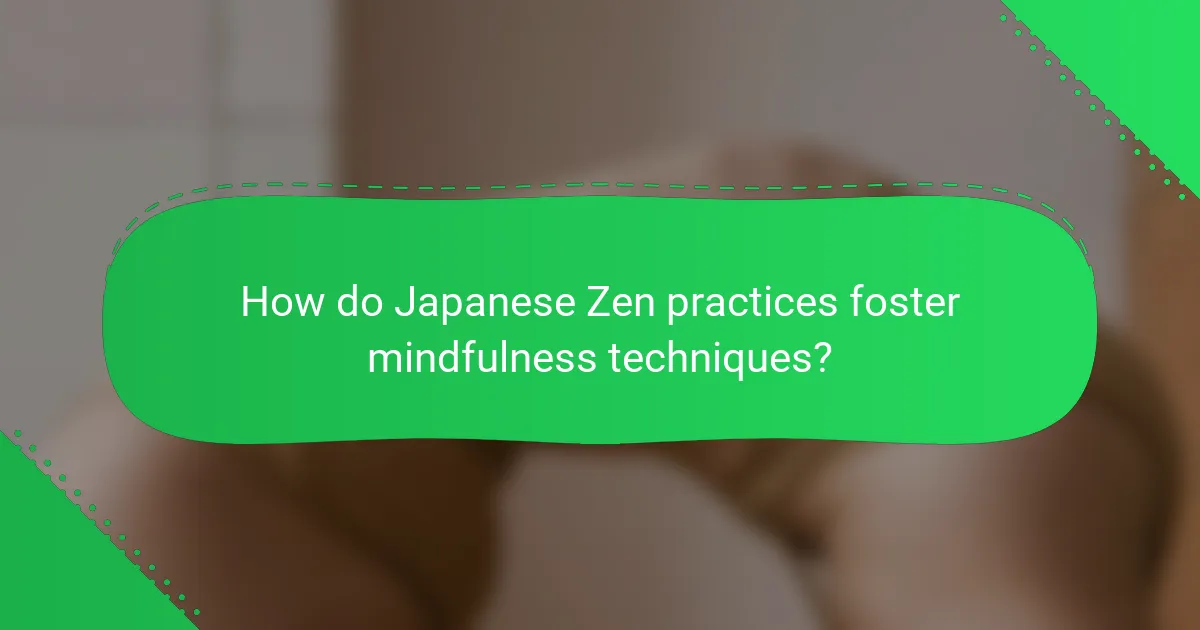Japanese Zen practices enhance holistic health through mindfulness techniques that promote mental clarity and emotional stability. Key practices include zazen meditation and kinhin walking meditation, which foster present-moment awareness. Regular engagement in these techniques leads to reduced stress and improved focus. Research shows these practices can lower cortisol levels and enhance overall well-being.

How do Japanese Zen practices foster mindfulness techniques?
Japanese Zen practices enhance mindfulness techniques by promoting deep awareness and presence in daily activities. These practices, such as zazen meditation and mindful breathing, cultivate a non-judgmental observation of thoughts and feelings. As a result, practitioners experience reduced stress and improved emotional regulation. Zen’s emphasis on simplicity and acceptance fosters a holistic approach to health, integrating mental clarity and physical well-being. Regular engagement in these practices leads to long-term benefits, including enhanced focus and resilience.
What are the foundational principles of Zen mindfulness?
The foundational principles of Zen mindfulness include awareness, presence, and acceptance. These principles emphasize being fully engaged in the moment, observing thoughts and feelings without judgment, and fostering a deep connection to oneself and the environment. Practicing these principles can enhance emotional regulation and overall well-being. Zen mindfulness encourages simplicity and clarity, promoting a holistic approach to health by integrating mental, emotional, and physical aspects of life.
How is meditation integrated into daily Zen practices?
Meditation is essential in daily Zen practices, fostering mindfulness and presence. Practitioners integrate meditation through structured routines, often beginning and ending their day with focused sessions. This regular practice enhances emotional well-being and reduces stress, contributing to holistic health. Engaging in meditation allows individuals to cultivate awareness, leading to a deeper understanding of self and surroundings. The unique attribute of Zen meditation lies in its emphasis on simplicity and direct experience, making it accessible and impactful for practitioners.
What role does breathing play in mindfulness techniques?
Breathing is central to mindfulness techniques in Japanese Zen practices, fostering focus and relaxation. Controlled breathing enhances awareness of the present moment, reducing stress and promoting emotional balance. This practice, often referred to as “zazen,” emphasizes deep, rhythmic breaths, which help practitioners connect mind and body. As a result, consistent breathing exercises can lead to improved holistic health outcomes, such as lower anxiety levels and enhanced mental clarity.
How do Zen practices influence mental clarity and focus?
Zen practices enhance mental clarity and focus through mindfulness techniques. These techniques, such as meditation and breathing exercises, promote present-moment awareness. As a result, practitioners experience reduced stress and improved cognitive function. Studies show that regular engagement in Zen practices can lead to lasting changes in brain structure, particularly in areas related to attention and emotional regulation. This holistic approach supports overall mental health, fostering resilience and clarity in daily life.

What are the holistic health benefits of Zen mindfulness practices?
Zen mindfulness practices significantly enhance holistic health by promoting mental clarity, emotional stability, and physical well-being. These techniques foster stress reduction and improved focus, contributing to overall life satisfaction.
Research indicates that regular engagement in Zen practices can lower cortisol levels, enhance immune function, and improve cardiovascular health. Practitioners often report increased feelings of peace and reduced anxiety, creating a more balanced lifestyle.
Unique attributes of Zen mindfulness include its emphasis on present-moment awareness and non-judgmental observation, which differentiate it from other mindfulness techniques. Rarely, individuals may experience profound insights or transformative life changes as a result of deep Zen practice.
In summary, the holistic health benefits of Zen mindfulness practices encompass a range of physical, mental, and emotional improvements that contribute to a more fulfilling life.
How does Zen mindfulness impact stress reduction?
Zen mindfulness significantly reduces stress by promoting present-moment awareness and emotional regulation. Techniques such as meditation and breathing exercises enhance mental clarity and foster relaxation. Studies show that regular practice lowers cortisol levels, leading to decreased anxiety. Additionally, Zen mindfulness cultivates resilience, enabling individuals to cope better with stressors. This holistic approach benefits overall well-being, enhancing both mental and physical health.
What effects do Zen practices have on emotional well-being?
Zen practices significantly enhance emotional well-being by promoting mindfulness and reducing stress. These techniques foster a deeper connection to the present moment, which can lead to improved mood and emotional stability. Regular engagement in Zen meditation has been linked to lower levels of anxiety and depression, as well as increased resilience to emotional challenges. Additionally, the practice encourages self-awareness, allowing individuals to better understand and manage their emotions. Research indicates that consistent mindfulness practice can lead to long-term improvements in overall mental health.
How can Zen mindfulness improve physical health?
Zen mindfulness significantly enhances physical health by reducing stress, improving sleep quality, and boosting immune function. Mindfulness practices, such as meditation and breathing exercises, promote relaxation and mental clarity. Research shows that regular mindfulness meditation can lower blood pressure and alleviate chronic pain. Participants in mindfulness programs report increased energy levels and improved overall well-being, contributing to a holistic approach to health.
Which studies support the health benefits of Zen practices?
Research supports the health benefits of Japanese Zen practices, particularly mindfulness techniques. Studies indicate these practices reduce stress, enhance emotional well-being, and improve cognitive function. For instance, a meta-analysis found mindfulness meditation significantly decreases anxiety and depression symptoms. Furthermore, a randomized controlled trial showed that participants practicing Zen mindfulness experienced notable improvements in overall life satisfaction. These findings highlight the holistic health impacts of Zen practices on mental and emotional health.

Which unique mindfulness techniques are specific to Japanese Zen?
Japanese Zen incorporates unique mindfulness techniques that enhance mental clarity and emotional balance. Key practices include zazen, a seated meditation focusing on breath and posture, and kinhin, a walking meditation that promotes awareness in movement.
These techniques emphasize the importance of being present, fostering a deep connection to one’s surroundings. Zazen cultivates a calm mind, while kinhin integrates mindfulness into daily activities, supporting holistic health. The rare attribute of these practices lies in their simplicity and accessibility, making them effective for various lifestyles.
What is the significance of Zazen in Zen practice?
Zazen is crucial in Zen practice as it fosters deep mindfulness and self-awareness. This sitting meditation technique enhances mental clarity and emotional stability, contributing to holistic health. Practitioners report reduced stress and improved focus, demonstrating Zazen’s impact on overall well-being. Regular practice cultivates a unique attribute of inner peace, distinguishing it from other mindfulness techniques.
How does Kinhin differ from traditional walking meditation?
Kinhin differs from traditional walking meditation by incorporating mindful breathing and intentional pauses. In Kinhin, practitioners synchronize their breath with each step, promoting deeper awareness. Traditional walking meditation often emphasizes continuous movement without this structured breathing rhythm. Kinhin emphasizes a unique attribute of intentionality, enhancing the meditative experience and fostering holistic health benefits.

What are some rare but impactful Zen mindfulness practices?
Some rare but impactful Zen mindfulness practices include Zazen, Kinhin, and Shikantaza. Zazen involves seated meditation focusing on breath, enhancing mental clarity. Kinhin is walking meditation that fosters awareness in movement. Shikantaza, or “just sitting,” emphasizes presence without specific focus, promoting deep relaxation and insight. These techniques contribute to holistic health by reducing stress and improving emotional well-being.
How does Shikantaza practice enhance awareness?
Shikantaza practice enhances awareness by promoting deep, non-reactive observation of thoughts and sensations. This mindfulness technique fosters a heightened state of presence, allowing practitioners to cultivate a more profound understanding of their mental and emotional patterns. As a result, individuals experience improved clarity and focus, which positively impacts overall holistic health. Regular engagement in Shikantaza can lead to reduced stress, enhanced emotional regulation, and increased resilience, contributing to well-being and balance in daily life.
What is the role of art and aesthetics in Zen mindfulness?
Art and aesthetics play a crucial role in Zen mindfulness by enhancing focus and promoting tranquility. Engaging with art fosters a deeper connection to the present moment, which is essential in Zen practices. Visual elements, such as simplicity and natural beauty, align with Zen principles, encouraging mindfulness through observation. This interaction with art can reduce stress, enhance emotional well-being, and support holistic health. Additionally, unique attributes of specific art forms, like calligraphy or garden design, exemplify Zen’s emphasis on impermanence and balance, further enriching the mindfulness experience.

How can individuals incorporate Zen mindfulness into their lives?
Individuals can incorporate Zen mindfulness into their lives through daily practices that promote awareness and presence. Start with meditation, focusing on breath and letting go of distractions. Integrate mindful walking, paying attention to each step and sensation. Engage in mindful eating, savoring each bite and appreciating flavors. Establish a routine for these practices to enhance consistency and impact on holistic health. As a result, individuals can experience reduced stress and improved emotional well-being.
What are practical steps to begin Zen meditation?
To begin Zen meditation, follow these practical steps: find a quiet space, sit comfortably, focus on your breath, and gently return your attention when distractions arise. Start with short sessions and gradually increase the duration. Consistency is key for achieving mindfulness and enhancing holistic health.
How can mindfulness be integrated into everyday activities?
Mindfulness can be integrated into everyday activities through simple Japanese Zen practices. Techniques such as mindful breathing, tea ceremonies, and walking meditation promote awareness and presence in daily tasks. For example, focusing on the sensation of tea preparation enhances appreciation of the moment. Engaging fully in activities like eating or cleaning cultivates a deeper connection to the present, improving overall well-being. As a result, these practices contribute to holistic health by reducing stress and increasing mental clarity.
What common mistakes should be avoided in Zen practice?
Common mistakes in Zen practice include overthinking, unrealistic expectations, neglecting the breath, and inconsistency. These pitfalls can hinder mindfulness and overall holistic health benefits.
Overthinking creates mental clutter, making it difficult to focus on the present moment. Unrealistic expectations lead to frustration, detracting from the journey of self-discovery. Neglecting the breath disrupts the connection to the body, which is essential for effective mindfulness. Lastly, inconsistency in practice diminishes the potential for long-term benefits, making it vital to establish a regular routine.
What expert tips enhance the effectiveness of Zen mindfulness?
Practicing Zen mindfulness can be enhanced by incorporating specific expert tips. Focus on breath awareness to anchor your attention and reduce distractions. Establish a consistent routine for practice, which helps cultivate discipline and depth. Engage in mindful walking, integrating movement with awareness, promoting physical and mental balance. Lastly, embrace non-judgmental observation, allowing thoughts and feelings to pass without attachment, fostering a sense of peace.
